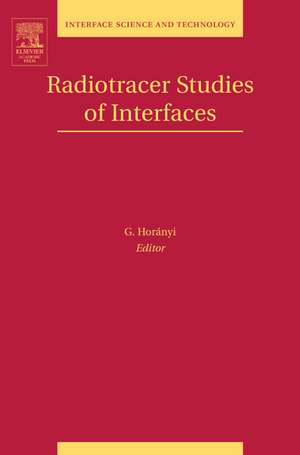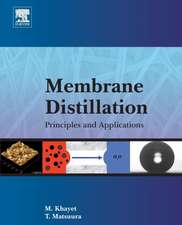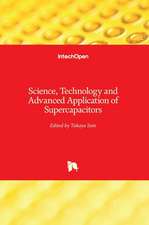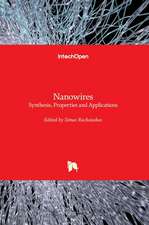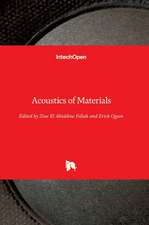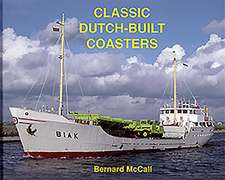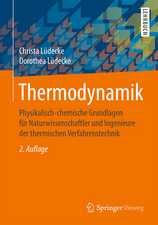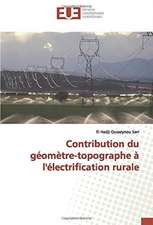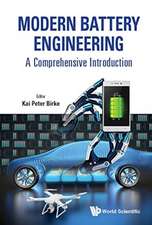Radiotracer Studies of Interfaces: Interface Science and Technology, cartea 3
Editat de G. Horanyien Limba Engleză Hardback – 18 sep 2004
- Demonstrates the use of radiotracers
- Contains a detailed discussion of double-layer phenomena
- Separate chapters are devoted to the most important branches of science where radiotracer study of interfacial phenomena plays an important role
Din seria Interface Science and Technology
- 27%
 Preț: 1289.94 lei
Preț: 1289.94 lei - 27%
 Preț: 865.37 lei
Preț: 865.37 lei - 27%
 Preț: 759.61 lei
Preț: 759.61 lei - 9%
 Preț: 796.86 lei
Preț: 796.86 lei - 28%
 Preț: 914.43 lei
Preț: 914.43 lei - 27%
 Preț: 966.51 lei
Preț: 966.51 lei - 24%
 Preț: 1107.29 lei
Preț: 1107.29 lei - 28%
 Preț: 1083.46 lei
Preț: 1083.46 lei - 24%
 Preț: 957.36 lei
Preț: 957.36 lei - 24%
 Preț: 752.69 lei
Preț: 752.69 lei - 29%
 Preț: 953.39 lei
Preț: 953.39 lei - 29%
 Preț: 1015.50 lei
Preț: 1015.50 lei - 29%
 Preț: 955.90 lei
Preț: 955.90 lei - 29%
 Preț: 955.72 lei
Preț: 955.72 lei - 29%
 Preț: 801.92 lei
Preț: 801.92 lei - 24%
 Preț: 1019.11 lei
Preț: 1019.11 lei - 23%
 Preț: 1084.74 lei
Preț: 1084.74 lei - 24%
 Preț: 1079.23 lei
Preț: 1079.23 lei - 27%
 Preț: 1176.12 lei
Preț: 1176.12 lei - 19%
 Preț: 1440.00 lei
Preț: 1440.00 lei - 14%
 Preț: 1121.36 lei
Preț: 1121.36 lei - 23%
 Preț: 1080.05 lei
Preț: 1080.05 lei - 24%
 Preț: 1071.37 lei
Preț: 1071.37 lei - 23%
 Preț: 1413.84 lei
Preț: 1413.84 lei
Preț: 1031.75 lei
Preț vechi: 1413.35 lei
-27% Nou
Puncte Express: 1548
Preț estimativ în valută:
197.42€ • 206.68$ • 163.36£
197.42€ • 206.68$ • 163.36£
Carte tipărită la comandă
Preluare comenzi: 021 569.72.76
Specificații
ISBN-13: 9780120884957
ISBN-10: 012088495X
Pagini: 450
Dimensiuni: 165 x 240 x 23 mm
Greutate: 0.95 kg
Editura: ELSEVIER SCIENCE
Seria Interface Science and Technology
ISBN-10: 012088495X
Pagini: 450
Dimensiuni: 165 x 240 x 23 mm
Greutate: 0.95 kg
Editura: ELSEVIER SCIENCE
Seria Interface Science and Technology
Public țintă
Researchers, practitioners and students working in a wide variety of subject areas such as catalysis, electrochemistry, colloid science, corrosion science and biochemistry.Cuprins
Chapter 1. Historical background.
Chapter 2. Advantages of the radiotracer technique.
Chapter 3. Adsorption and catalytic reactions at solid/gas interfaces.
Chapter 4. Studies of electrified solid/liquid interfaces.
Chapter 5. Colloidal systems; solid/liquid interfaces.
Chapter 6. Study of liquid/fluid interfaces.
Chapter 7. Study of phenomena occurring at solid/solid interfaces. Investigation of interface diffusion and segregation by radiotracer technique.
Chapter 8. Sorption (binding) and transport phenomena in biomembranes.
Chapter 9. Instrumentation.
Chapter 10.1. The role of interfacial phenomena in the contamination and decontamination of nuclear reactors.
Chapter 10.2. Environmental problems.
Chapter 2. Advantages of the radiotracer technique.
Chapter 3. Adsorption and catalytic reactions at solid/gas interfaces.
Chapter 4. Studies of electrified solid/liquid interfaces.
Chapter 5. Colloidal systems; solid/liquid interfaces.
Chapter 6. Study of liquid/fluid interfaces.
Chapter 7. Study of phenomena occurring at solid/solid interfaces. Investigation of interface diffusion and segregation by radiotracer technique.
Chapter 8. Sorption (binding) and transport phenomena in biomembranes.
Chapter 9. Instrumentation.
Chapter 10.1. The role of interfacial phenomena in the contamination and decontamination of nuclear reactors.
Chapter 10.2. Environmental problems.
Recenzii
"In total there are more than one-thousand references. The editor has unified the style of each o the chapters so that each one flows effortlessly into the text. This book can be considered a 'must have' for any current researcher studying the field interfaces using tracers and for those who are considering getting into this area." --S. Landsberger, University of Texas at Austin, USA, JOURNAL OF RADIOANALYTICAL AND NUCLEAR CHEMISTRY, '04
"This book is commended to readers interested in the applications of radiotracers to the study of interfacial phenomena, particularly adsorption and surface catalysis, electrified interfaces and colloidal systems, interfacical diffusion, monolayers at fluid-fluid interfaces, biomembranes, and environmental interfaces." --Arther Hubbard, JOURNAL OF COLLOID AND INTERFACE SCIENCE, Vol.287, 2005
"This book is an excellent introduction to the field of radiotracer studies on interfacial phenomena. It reports many of the latest, state-of-the-art experimental observations which are explained in a clear and comprehensive manner. Therefore, I can warmly recommend this book, first of all to electrochemists, solid-state physicists, biologists, and nuclear engineers, but also to researchers, engineers and students in many other areas of science and industry." --Katharina Kohse-Höinghaus, Professor of Physical Chemistry, Bielefield University, Germany, OPTICS AND PHOTONICS NEWS, Vol. 16, No. 5, 2005
"This book is commended to readers interested in the applications of radiotracers to the study of interfacial phenomena, particularly adsorption and surface catalysis, electrified interfaces and colloidal systems, interfacical diffusion, monolayers at fluid-fluid interfaces, biomembranes, and environmental interfaces." --Arther Hubbard, JOURNAL OF COLLOID AND INTERFACE SCIENCE, Vol.287, 2005
"This book is an excellent introduction to the field of radiotracer studies on interfacial phenomena. It reports many of the latest, state-of-the-art experimental observations which are explained in a clear and comprehensive manner. Therefore, I can warmly recommend this book, first of all to electrochemists, solid-state physicists, biologists, and nuclear engineers, but also to researchers, engineers and students in many other areas of science and industry." --Katharina Kohse-Höinghaus, Professor of Physical Chemistry, Bielefield University, Germany, OPTICS AND PHOTONICS NEWS, Vol. 16, No. 5, 2005
